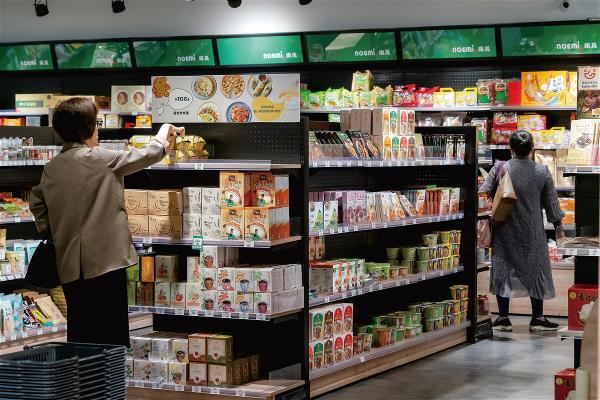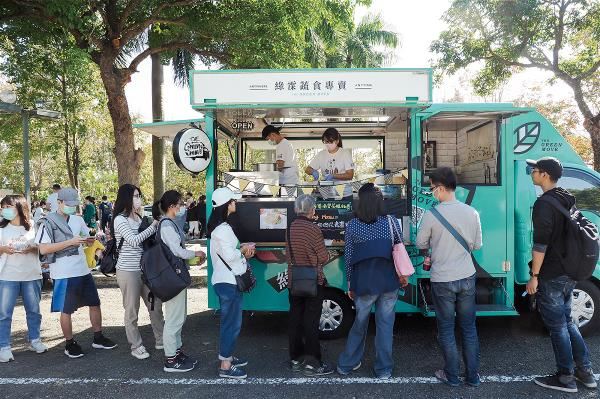2025-6-24
(Courtesy of Taiwan Panorama June 2025)
Lynn Su /photo by Lin Min-hsuan /tr. by Brandon Yen
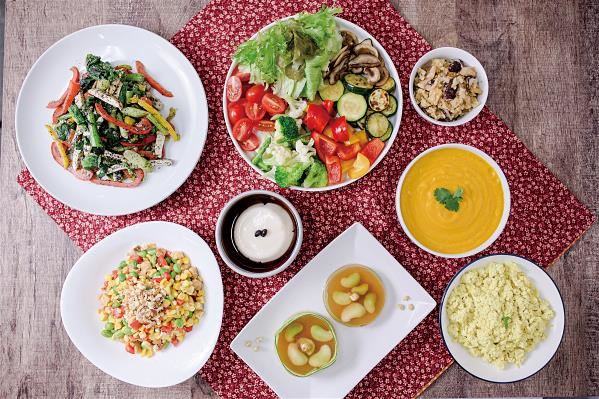
The trend of veganism is sweeping the globe. Taiwan is not to be outdone: across our islands, 14% of the population are vegetarians, while over 40% are flexitarians. The numbers continue to grow, shoring up Taiwan's vegetarian-related industries.
People practice vegetarianism for various reasons. The story of Philipopeye, director-general of the International Vegan Industry Promotion Association, is typical of early vegetarians in Taiwan. Philipopeye's parents worked in the food service industry. The family's fortunes used to rise and fall dramatically, starting to take a turn for the better only after they were inspired by an Yiguandao priest to become vegetarians. Philipopeye, who had been an avid meat eater, went vegetarian himself at the age of 18 and has never looked back. This type of religious vegetarianism had taken root in Taiwan long before veganism—with its abstinence from all animal-derived products—began to gain currency here.
Chang You-chuan, director-general of the Sustainable Healthy Diets Research Institute (SHDRI), is versed in the history of vegetarianism in Taiwan. He tells us that the development of religious vegetarianism in Taiwan is bound up with our evolution into a more open society.
After martial law was lifted in 1987, Buddhist communities—such as Fo Guang Shan, Dharma Drum Mountain, Chung Tai Shan, Ling Jiou Mountain, Tzu Chi, and Bliss and Wisdom—began to flourish across Taiwan. With Yiguandao being legalized the same year, many of these religious orders started to offer vegetarian food. They may not have required their lay followers to be vegetarians, but the doctrines they propounded inspired many to practice vegetarianism of their own accord. A sizable vegetarian population gradually came into being.

Reasons for going veggie
Chang, who has been in the front line of the vegetarian movement for many years, recalls that it was in 1991 that he, convinced that vegetarianism was good for the environment and food systems, decided to adopt a vegetarian diet. He soon discovered that many vegetarian restaurants and food processing companies were run by Yiguandao followers.
Around 2008, numerous non-governmental religious, environmental, and animal welfare organizations in Taiwan started to promote plant-based diets as a way to combat global warming. Some 1.19 million people joined the initiative. The slogan “Be Veg, Go Green, Save Our Planet” spread far and wide, forging close connections between vegetarianism, climate change, and other environmental issues.
The local Meat-Free Monday campaign was launched in 2009. For Chang, this marked a vital turning point in how vegetarianism was generally perceived in Taiwan. Leading the campaign at the time, he invited celebrities, public-sector organizations, and educational institutions to take part. Press conferences, public hearings, forums, and parades were held to publicize the movement. These events reinforced public awareness of how plant-based diets could help fight climate change.
In 2014 the animal protection movement gathered steam in Taiwan and became interlocked with the trend of veganism introduced from the West. Will Tuttle, author of The World Peace Diet, visited Taiwan several times between 2014 and 2019, giving rise to a wave of interest in veganism. Many locals began to identify with the idea of abstaining from foods and other products derived from animals.
“Over the past 30 years,” Chang says, “the number of vegetarians in Taiwan has been growing thanks to ideas and practices ranging from religion and environmentalism to animal protection and healthy living. Far from being mutually exclusive, these motives share common ground and amplify each other. This is a major characteristic of Taiwan’s vegetarian culture.” It is owing to initiatives like environmentalism and animal protection that all sorts of vegetarian restaurants continue to spring up across Taiwan today.
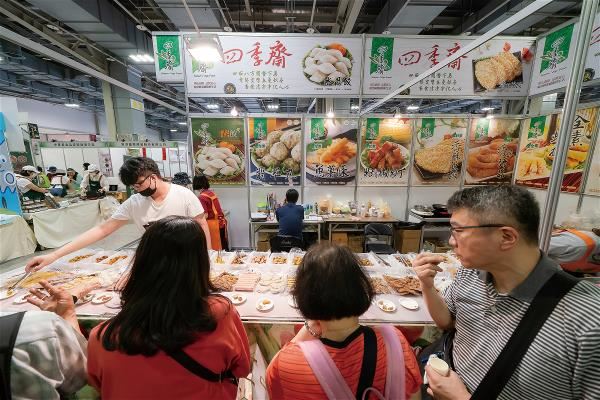

Nutrition
Another factor that distinguishes modern forms of vegetarianism from their predecessors is the introduction of nutritional science from abroad. Producers of processed vegetarian foods now set great store by nutritional value, as well as continuing to simulate the looks and textures of meat products. Many brands add iron, zinc, and calcium to their plant-based “meats,” and their meat alternatives can rival even beef in the amounts of protein and other nutrients they contain.
Joyce Chen, executive director of the Taiwan Vegetarian Nutrition Society (TVNS), is a dietitian with both Taiwanese and American qualifications. She became a vegetarian while studying in America, where she came under the influence of veganism. When she returned to Taiwan some ten years ago, she found that many locals practiced vegetarianism simply because they didn’t want to kill animals; they weren’t entirely clear about the nutritional implications of their diets. Over time, more and more vegetarians have become aware that healthy eating requires a conscious effort. Vegetarians, for example, are often deficient in iron and vitamin B12, of which meat is an excellent source, and in calcium if they avoid dairy products.
Nevertheless, vegetarians in Taiwan actually enjoy many advantages. Taiwan boasts a rich array of food ingredients, including a wonderful diversity of leafy greens. Chen says that vegetarians rely especially on dark-green leafy vegetables for iron and calcium. Among these vegetables, spinach contains a large amount of iron, and mustard greens are rich in calcium. Both are very easy to come by in Taiwan.
In addition, influenced by traditional Chinese diets, a dazzling variety of soybean products are available in the shops, such as tofu, dried tofu, tofu pudding, tofu skin, fried tofu, stinky tofu, and fermented tofu. Among the beans we see in daily life, yellow soybeans have the most protein, followed by black soybeans. Both are common in Taiwan. “We can say that in comparison with the West, it’s relatively easy and uncomplicated for meat eaters to change to a vegetarian diet here in Taiwan,” Chen says with a smile.
There are many nutrient-rich superfoods in Taiwan. Both camellia oil (dubbed “Oriental olive oil”) and perilla oil contain high levels of omega- 3 fatty acids. These long-chain fatty acids can help alleviate chronic inflammation, a common condition in modern times, and balance the excessive amounts of omega-6 fatty acids we absorb from soybean oil and vegetable oil when dining out.
Chen also mentions purslane (Portulaca oleracea), which likewise is rich in omega-3 fatty acids. Local guavas (Psidium guajava) abound in vitamin C. Moreover, Indian gooseberries (Phyllanthus emblica), which used to be common in rural Taiwan, have in recent years been promoted by government agricultural agencies—they contain exceptional amounts of vitamin C and high levels of antioxidants. Often made into powder, Indian gooseberries are a superb source of nutrients.
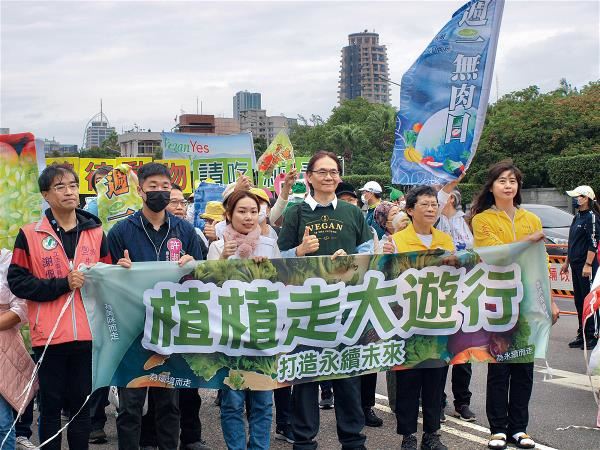
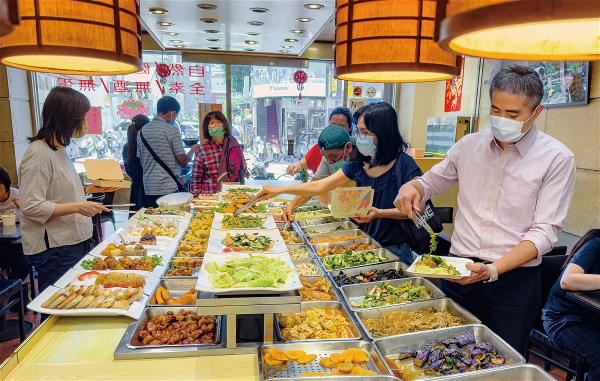
Restaurants and markets
Philipopeye, who works in the food service industry, says that even though Taiwan’s vegetarian community has growth potential, the industry as a whole was hit hard by the Covid-19 pandemic. At one time, people stopped dining out altogether, as a result of which several big vegetarian establishments that could seat hundreds of customers closed their doors permanently, unable to defray their personnel costs.
Their customers have since scattered in various directions. Aside from the small vegetarian eateries which are blooming everywhere in Taiwan now, a few restaurants have gained immense popularity. Following the success of its vegetarian dim-sum restaurant in Taipei, the Yang Shin Group has shown an astonishing capacity for innovation by creating Yache, which offers vegetarian Korean dishes, and Yang Shin Vege Salon, which specializes in vegetarian reinterpretations of Jiangsu–Zhejiang cuisine. With more and more non-vegetarian venues embracing vegetarian options, the rigid lines that used to separate vegetarian and non-vegetarian restaurants are beginning to blur.
Since 2005, the International Vegan Industry Promotion Association has been holding annual exhibitions in Taipei to keep vegetarian consumers and food service businesses up to date. “New types of vegetarian foods and products, like their non-vegetarian counterparts, keep entering the market,” Philipopeye observes. Vegetarian snacks such as tempeh and tofu skin have become popular in recent years.

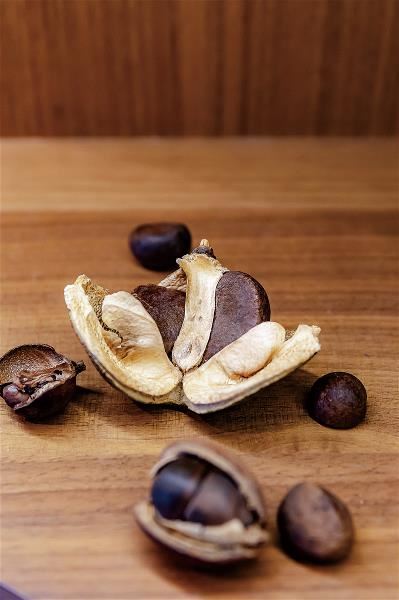
Around the time of the pandemic, many supermarkets specializing in vegetarian products began to appear in Taiwan. Goodie Vegie in Taichung has expanded northward, opening Noemí in Taipei. Other examples include CDF in New Taipei’s Zhonghe District and VES Supermarket in Tainan.
These supermarkets have managed to avoid the religious solemnity with which vegetarianism has conventionally been associated. Offering not only authentic local products but also imported goods, their premises exude a refreshing, delightful, and even trendy vibe. Even though there are far fewer of them than traditional chain supermarkets, their existence attests to a strong and stable customer base, as well as to the sophistication and diversity of vegetarian ingredients and processed foods in Taiwan.
In parallel with these meatless supermarkets, the last decade saw the emergence of various vegetarian pop-up markets. Taiwan Vegan Frenzy, the oldest of them, was inaugurated in 2015. No Meat was founded in 2019 to celebrate the pleasures of meatless diets while propagating the principles of no plastics and sustainability. There is also the Little Vegetarian Night Market, with numerous food vans traveling around different parts of Taiwan.
These phenomena all resonate with what Chang You-chuan draws our attention to: Taiwan is a place with a richly diverse culinary culture. In addition to the classic mock meats—vegetarian chicken (suji) and duck (suya)—of earlier years, Japanese kaiseki multicourse haute cuisine, known for its deft use of vegetarian ingredients, is another vital element of Taiwanese food culture. The spirit of innovation and fusion accounts for the vibrancy and remarkably varied character of our local vegetarian culture.
Taiwan boasts an abundance of different fruits and vegetables and a wide range of meat alternatives. Vegetarian foods are offered at streetside stalls and high-end restaurants alike, in styles ranging from familiar Asian and Western cuisines to more exotic options. Vegetarians in Taiwan have cause to congratulate themselves. They often say that Taiwan is a vegetarians’ paradise which always welcomes newcomers with open arms.

